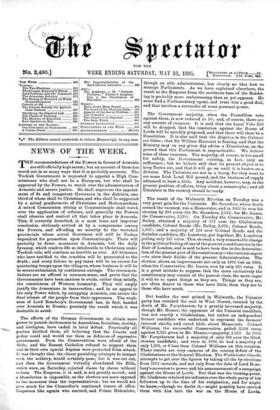The efforts of the German Government to obtain more power
to punish incitements to Anarchism, Socialism, mutiny, and irreligion, have ended in total defeat. Practically all parties disliked them, all believing that the Courts and police could and would use them as defences of repressive government. Even the Conservatives were afraid of the Bills; and the Roman Catholics refused to support them unlcs's their own special dogmas were protected from attack. It was thought that the clause punishing attempts to tamper with the soldiery, would certainly pass ; but it was cut out, and then the Government virtually abandoned the Bills, which were, on Saturday, rejected clause by clause without -hate. The Emperor, it is said, is not greatly moved ; and a. Dissolution is impossible, as the electors are more opposed to the measures than the representatives ; but we would not give much for the Chancellor's continued tenure of office. Emperors like agents who succeed, and Prince Hohenlohe, though an able administrator, has clearly no idea how to manage Parliaments. As we have explained elsewhere, the result to the Emperor from the mutinous tone of the Reichs- tag is probably more embarrassing than as yet appears. He must find a Parliamentary agent, and trust him a good deal, and that involves a surrender of some personal power.






































